新标准3课文。
新标准大学英语综合教程3课文翻译(完整版)
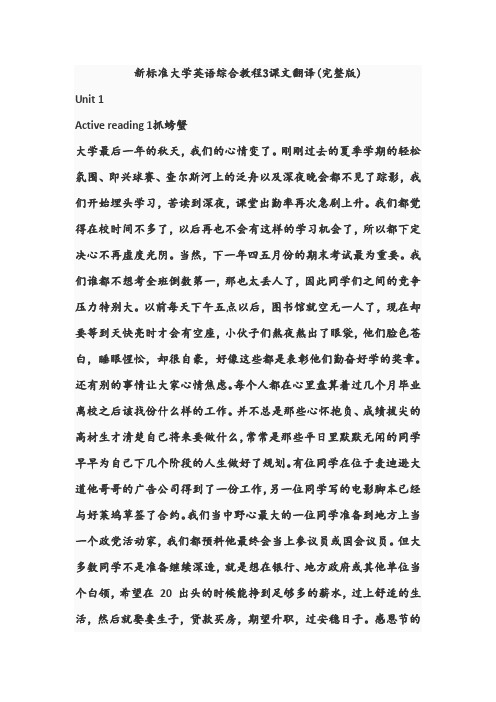
新标准大学英语综合教程3课文翻译(完整版)Unit 1Active reading 1抓螃蟹大学最后一年的秋天,我们的心情变了。
刚刚过去的夏季学期的轻松氛围、即兴球赛、查尔斯河上的泛舟以及深夜晚会都不见了踪影,我们开始埋头学习,苦读到深夜,课堂出勤率再次急剧上升。
我们都觉得在校时间不多了,以后再也不会有这样的学习机会了,所以都下定决心不再虚度光阴。
当然,下一年四五月份的期末考试最为重要。
我们谁都不想考全班倒数第一,那也太丢人了,因此同学们之间的竞争压力特别大。
以前每天下午五点以后,图书馆就空无一人了,现在却要等到天快亮时才会有空座,小伙子们熬夜熬出了眼袋,他们脸色苍白,睡眼惺忪,却很自豪,好像这些都是表彰他们勤奋好学的奖章。
还有别的事情让大家心情焦虑。
每个人都在心里盘算着过几个月毕业离校之后该找份什么样的工作。
并不总是那些心怀抱负、成绩拔尖的高材生才清楚自己将来要做什么,常常是那些平日里默默无闻的同学早早为自己下几个阶段的人生做好了规划。
有位同学在位于麦迪逊大道他哥哥的广告公司得到了一份工作,另一位同学写的电影脚本已经与好莱坞草签了合约。
我们当中野心最大的一位同学准备到地方上当一个政党活动家,我们都预料他最终会当上参议员或国会议员。
但大多数同学不是准备继续深造,就是想在银行、地方政府或其他单位当个白领,希望在20 出头的时候能挣到足够多的薪水,过上舒适的生活,然后就娶妻生子,贷款买房,期望升职,过安稳日子。
感恩节的时候我回了一趟家,兄弟姐妹们免不了不停地问我毕业后有什么打算,我不知道该说什么。
实际上,我知道该说什么,但我怕他们批评我,所以只对他们说了别人都准备干什么。
父亲看着我,什么也没说。
夜深时,他叫我去他的书房。
我们坐了下来,他给我们俩各倒了杯饮料。
“怎么样?”他问。
“啊,什么怎么样?”“你毕业后到底想做什么?”他问道。
父亲是一名律师,我一直都认为他想让我去法学院深造,追随他的人生足迹,所以我有点儿犹豫。
新标准大学英语3课文翻译
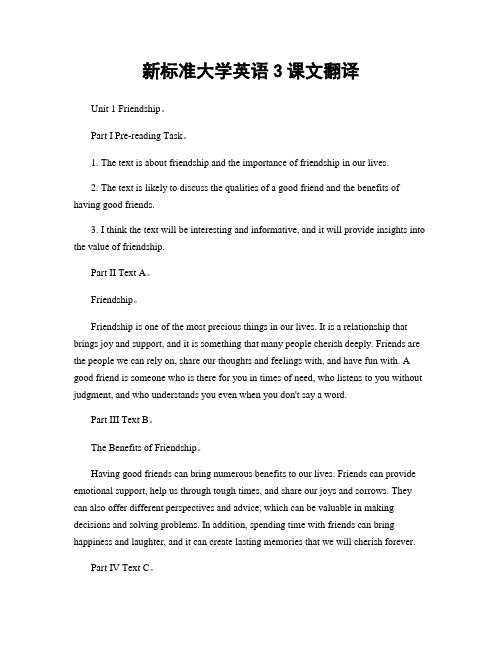
新标准大学英语3课文翻译Unit 1 Friendship。
Part I Pre-reading Task。
1. The text is about friendship and the importance of friendship in our lives.2. The text is likely to discuss the qualities of a good friend and the benefits of having good friends.3. I think the text will be interesting and informative, and it will provide insights into the value of friendship.Part II Text A。
Friendship。
Friendship is one of the most precious things in our lives. It is a relationship that brings joy and support, and it is something that many people cherish deeply. Friends are the people we can rely on, share our thoughts and feelings with, and have fun with. A good friend is someone who is there for you in times of need, who listens to you without judgment, and who understands you even when you don't say a word.Part III Text B。
新标准大学英语综合教程3课文翻译
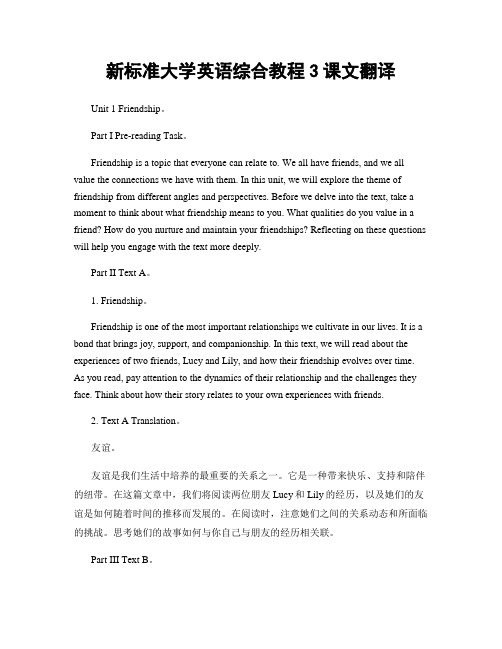
新标准大学英语综合教程3课文翻译Unit 1 Friendship。
Part I Pre-reading Task。
Friendship is a topic that everyone can relate to. We all have friends, and we all value the connections we have with them. In this unit, we will explore the theme of friendship from different angles and perspectives. Before we delve into the text, take a moment to think about what friendship means to you. What qualities do you value in a friend? How do you nurture and maintain your friendships? Reflecting on these questions will help you engage with the text more deeply.Part II Text A。
1. Friendship。
Friendship is one of the most important relationships we cultivate in our lives. It is a bond that brings joy, support, and companionship. In this text, we will read about the experiences of two friends, Lucy and Lily, and how their friendship evolves over time. As you read, pay attention to the dynamics of their relationship and the challenges they face. Think about how their story relates to your own experiences with friends.2. Text A Translation。
新标准大学英语3unit1-wearealldying原文+译文

新标准大学英语3U N I T1-W e a r e a l l d y i n g原文+译文(总7页)本页仅作为文档封面,使用时可以删除This document is for reference only-rar21year.MarchWe are all dying我们都在走向死亡have some good news and some bad news for you (as the joke goes). The bad news – and I'm very sorry to be the bearer – is that we are all dying. It's true. I've checked it out. In fact, I've double – and triple-checked it. I've had it substantiated and, well, there's no easy way to say it. we are dying. It's something that I always kind of knew, but never really chose to think about too much. But the fact is, within the next 70 or 80 years – depending on how old you are and how long you last – we are all going to be either coffin dwellers or trampled ash in the rose garden of some local cemetery. We may not even last that long. After all, we never quite know when the hooded, scythe-carrying, bringer-of-the-last-breath might come-a-calling. It could be sooner than we'd like. I have watched death from the sidelines, quite recently in fact, and nothing underlines the uncertainty and absolute frailty of humanity like the untimely exit of a friend.我给你带来一条好消息,还有一条坏消息(正如笑话所说的)。
新标准大学英语三课文参考翻译
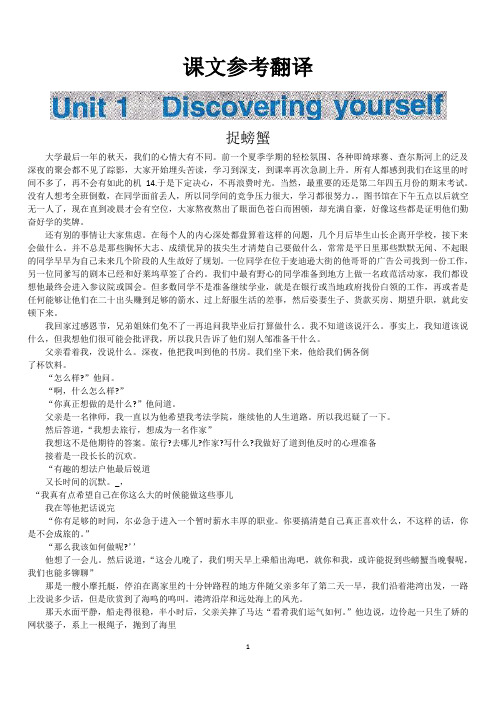
课文参考翻译捉螃蟹大学最后一年的秋天,我们的心情大有不同。
前一个夏季学期的轻松氛围、各种即绮球赛、查尔斯河上的泛及深夜的聚会都不见了踪影,大家开始埋头苦读,学习到深支,到课率再次急剧上升。
所有人都感到我们在这里的时间不多了,再不会有如此的机14.于是下定决心,不再浪费时光。
当然,最重要的还是第二年四五月份的期末考试。
没有人想考全班倒数,在同学面前丢人,所以同学间的竞争压力很大,学习都很努力。
,图书馆在下午五点以后就空无一人了,现在直到凌晨才会有空位,大家熬夜熬出了眼面色苍白而困顿,却充满自豪,好像这些都是证明他们勤奋好学的奖牌。
还有别的事情让大家焦虑。
在每个人的内心深处都盘算着这样的问题,几个月后毕生山长企离开学校,接下来会做什么。
并不总是那些胸怀大志、成绩优异的拔尖生才清楚自己要做什么,常常是平日里那些默默无闻、不起眼的同学早早为自己未来几个阶段的人生故好了规划。
一位同学在位于麦迪逊大街的他哥哥的广告公司找到一份工作,另一位同爹写的剧本已经和好莱坞草签了合约。
我们中最有野心的同学准备到地方上做一名政范活动家,我们都设想他最终会进入参议院或国会。
但多数同学不是准备继续学业,就是在银行或当地政府找份白领的工作,再或者是任何能够让他们在二十出头赚到足够的箭水、过上舒服生活的差事,然后姿妻生子、货款买房、期望升职,就此安顿下来。
我回家过感恩节,兄弟姐妹们免不了一再追问我毕业后打算做什么。
我不知道该说汗么。
事实上,我知道该说什么,但我想他们很可能会批评我,所以我只告诉了他们别人邹准备干什么。
父亲看着我,没说什么。
深夜,他把我叫到他的书房。
我们坐下来,他给我们俩各倒了杯饮料。
“怎么样?”他问。
“啊,什么怎么样?”“你真正想做的是什么?”他问道。
父亲是一名律师,我一直以为他希望我考法学院,继续他的人生道路。
所以我迟疑了一下。
然后答道,“我想去旅行,想成为一名作家”我想这不是他期待的答案。
旅行?去哪儿?作家?写什么?我做好了道到他反时的心理准备接着是一段长长的沉欢。
新标准大学英语综合教程3课文翻译
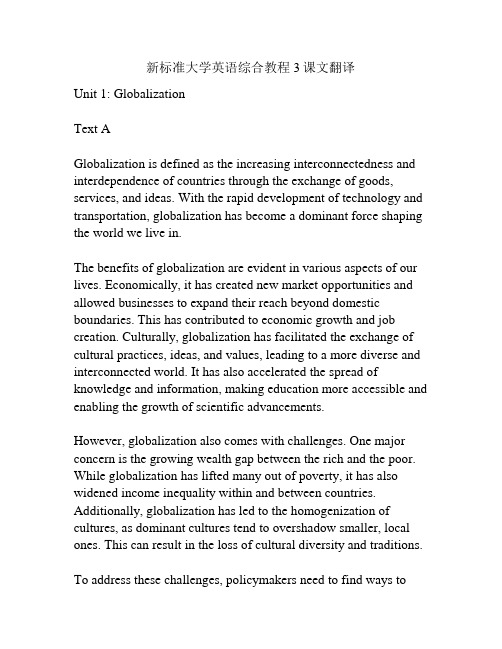
新标准大学英语综合教程3课文翻译Unit 1: GlobalizationText AGlobalization is defined as the increasing interconnectedness and interdependence of countries through the exchange of goods, services, and ideas. With the rapid development of technology and transportation, globalization has become a dominant force shaping the world we live in.The benefits of globalization are evident in various aspects of our lives. Economically, it has created new market opportunities and allowed businesses to expand their reach beyond domestic boundaries. This has contributed to economic growth and job creation. Culturally, globalization has facilitated the exchange of cultural practices, ideas, and values, leading to a more diverse and interconnected world. It has also accelerated the spread of knowledge and information, making education more accessible and enabling the growth of scientific advancements.However, globalization also comes with challenges. One major concern is the growing wealth gap between the rich and the poor. While globalization has lifted many out of poverty, it has also widened income inequality within and between countries. Additionally, globalization has led to the homogenization of cultures, as dominant cultures tend to overshadow smaller, local ones. This can result in the loss of cultural diversity and traditions. To address these challenges, policymakers need to find ways toensure that the benefits of globalization are shared by all. This includes implementing fair trade practices, promoting sustainable development, and investing in education and healthcare. Furthermore, it is crucial to celebrate and preserve cultural diversity, respecting and valuing the unique contributions of different societies.In conclusion, globalization has drastically transformed the world we live in, bringing both benefits and challenges. By addressing these challenges head-on, we can create a more inclusive and sustainable global community that embraces diversity and promotes shared prosperity.Text BOver the past few decades, globalization has become an undeniable reality in our society. It is driven by factors such as advancements in technology, international trade, and the rapid flow of capital and information.Globalization has had a profound impact on the economy, politics, culture, and daily life of people around the world. Economically, it has allowed businesses to expand their operations globally, leading to increased trade and investment. Politically, it has fostered cooperation among nations and encouraged the formation of international organizations and agreements. Culturally, globalization has facilitated the exchange of ideas, art, music, and cuisine, resulting in a more interconnected and multicultural world. In our daily lives, globalization has made it easier for us to travel, communicate, and access products and services from differentparts of the world.However, globalization has also faced criticism and resistance. Critics argue that it often benefits multinational corporations and developed countries at the expense of developing nations and local communities. They claim that globalization promotes exploitation, weakens labor rights, and leads to the loss of traditional industries and jobs.Despite the challenges and criticisms, it is clear that globalization is here to stay. As our world becomes increasingly interconnected, it is essential to find ways to maximize its benefits while mitigating its negative effects. This requires strong international cooperation and policies that promote sustainable and inclusive growth.In conclusion, globalization is a complex and multifaceted phenomenon that has significantly shaped our world. While it has brought about many positive changes, it also poses challenges that need to be addressed. Only through effective governance and cooperation can we harness the potential of globalization for the betterment of all.。
新标准大学英语3课文
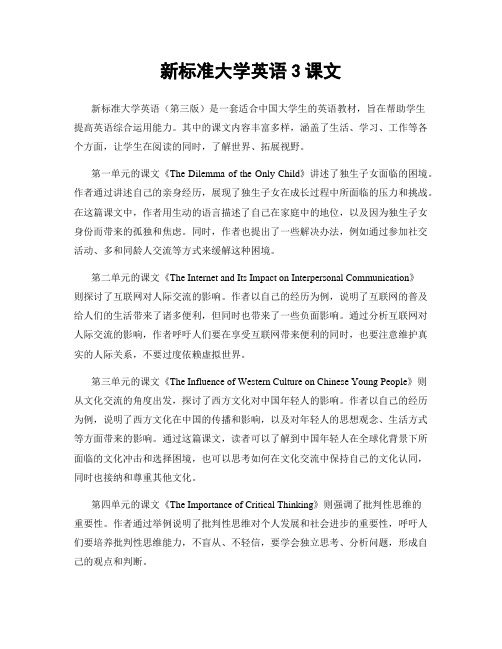
新标准大学英语3课文新标准大学英语(第三版)是一套适合中国大学生的英语教材,旨在帮助学生提高英语综合运用能力。
其中的课文内容丰富多样,涵盖了生活、学习、工作等各个方面,让学生在阅读的同时,了解世界、拓展视野。
第一单元的课文《The Dilemma of the Only Child》讲述了独生子女面临的困境。
作者通过讲述自己的亲身经历,展现了独生子女在成长过程中所面临的压力和挑战。
在这篇课文中,作者用生动的语言描述了自己在家庭中的地位,以及因为独生子女身份而带来的孤独和焦虑。
同时,作者也提出了一些解决办法,例如通过参加社交活动、多和同龄人交流等方式来缓解这种困境。
第二单元的课文《The Internet and Its Impact on Interpersonal Communication》则探讨了互联网对人际交流的影响。
作者以自己的经历为例,说明了互联网的普及给人们的生活带来了诸多便利,但同时也带来了一些负面影响。
通过分析互联网对人际交流的影响,作者呼吁人们要在享受互联网带来便利的同时,也要注意维护真实的人际关系,不要过度依赖虚拟世界。
第三单元的课文《The Influence of Western Culture on Chinese Young People》则从文化交流的角度出发,探讨了西方文化对中国年轻人的影响。
作者以自己的经历为例,说明了西方文化在中国的传播和影响,以及对年轻人的思想观念、生活方式等方面带来的影响。
通过这篇课文,读者可以了解到中国年轻人在全球化背景下所面临的文化冲击和选择困境,也可以思考如何在文化交流中保持自己的文化认同,同时也接纳和尊重其他文化。
第四单元的课文《The Importance of Critical Thinking》则强调了批判性思维的重要性。
作者通过举例说明了批判性思维对个人发展和社会进步的重要性,呼吁人们要培养批判性思维能力,不盲从、不轻信,要学会独立思考、分析问题,形成自己的观点和判断。
新标准大学英语 课文原文

新标准大学英语课文原文New Standard College English Text Original。
Unit 1。
Part I Pre-reading Task。
Text A。
The Dangers of Smoking。
Smoking is a dangerous habit. It causes many different diseases, such as lung cancer and heart disease. Many people die from smoking-related illnesses every year. In addition, smoking can harm other people who are nearby. This is called passive smoking. The smoke from a cigarette not only affects the person who is smoking, but also the people around them. This is why many countries have banned smoking in public places.Part II Global Reading。
Text A。
The Dangers of Smoking。
Smoking is a dangerous habit that can have serious consequences. It not only harms the person who smokes, but also those around them. The smoke from a cigarette can cause lung cancer, heart disease, and many other illnesses. In addition, passive smoking can also lead to health problems for non-smokers. This is why it is important to create smoke-free environments in public places.Part III Detailed Reading。
(2020年7月整理)新标准大学英语综合教程3课文翻译.doc

Unit 01 Working Holiday AbroadHow My Working Holiday Changed MeHayley1 Now that I have been home for a while and have had time to reflect on my working holiday in Vancouver, I’ve thought a lot about who I was before I left for Canada and who I am prese ntly.1 我回到家已经有一段时间了,有空回顾在温哥华的打工度假经历。
对于去加拿大之前的自我和如今的自我,我思考了很多。
2 Prior to leaving, I was not in a good place. I had suffered a lot of personal blows and felt emotionally stretched. I lost my grandma, my job and had two car crashes in five months. I needed something to change in my life, and that came in the form of a working holiday visa.2 出发前,我的境况不好。
个人生活上经受了许多打击,精神压力很大。
我失去了我的祖母,我的工作,5个月里遭遇两起车祸。
我需要生活得到改变,于是便有了打工度假签证这回事。
3 In less than three months I filled out the necessary paperwork, booked my plane ticket and fled Brisbane. I spent fifteen months living and working in Vancouver, Canada and eighteen months in total away from Australia. This is how that working holiday changed me and my life.3 在不到三个月的时间里,我填写了所需的表格,订好了机票,逃离布里斯班。
新标准大学英语综合教程3课文原文

We all listen to music according to our separate capacities.But, for the sake of analysis, the whole listening process may become clearer if we break it up into its component parts, so to speak.In certain sense we all listen to music on three separate planes.For lack of a better terminology, one might name these: 1) the sensuous plane, 2) the expressive plane, 3) the sheerly musical plane.The only advantage to be gained from mechanically splitting up the listening process into these hypothetical planes is the clearer view to be had of the way in which we listen.The simplest way of listening to music is to listen for the sheer pleasure of the musical sound itself.That is the sensuous plane.It is the plane on which we hear music without thinking, without considering it in any way.One turns on the radio while doing something else andabsent-mindedly bathes in the sound.A kind of brainless but attractive state of mind is engendered by the mere sound appeal of the music.The surprising thing is that many people who consider themselves qualified music lovers abuse that plane in listening.They go to concerts in order to lose themselves.They use music as a consolation or an escape.They enter an ideal world where one doesn’t have to think of the realities of ever yday life.Of course they aren’t thinking about the music either.Music allows them to leave it, and they go off to a place to dream, dreaming because of and apropos of the music yet never quite listening to it.Yes, the sound appeal of music is a potent and primitive force, but you must not allow it to usurp a disproportionate share of your interest.The sensuous plane is an important one in music, a very important one, but it does not constitute the whole story.The second plane on which music exists is what I have called the expressive one.Here, immediately, we tread on posers have a way of shying away from any discussion of music’s expressive side.Did not Stravinsky himself proclaim that his music was an ―object‖, a ―thing‖, with a life of its own, and with no other meaning than its own purely musical existence?This intransigent attitude of Stravinsky’s may be due to the fact that so many people have tried to read different meanings into so many pieces.Heaven knows it is difficult enough to say preciselywhat it is that a piece of music means, to say it definitely to say it finally so that everyone is satisfied with yourexplanation.But that should not lead one to the other extreme of denying to music the right to be ―expressive‖.Listen, if you can,to the 48 fugue themes of Bach’s Well-tempered Clavichore.Listen to each theme, one after another.You will soon realize that each theme mirrors a different world of feeling.You will also soon realize that the more beautiful a theme seems to you the harder it is to find any word that will describe it to your complete satisfaction.Yes, you will certainly know whether it is a gaytheme or a sad one.You will be able, on other words, in your own mind, to draw a frame of emotional feeling around your theme.Now study the sad one a little closer.Try to pin down the exact quality of its sadness.Is it pessimistically sad or resignedly sad; is it fatefully sad or smilingly sad?Let us suppose that you are fortunate and can describe to your own satisfactionin so many words the exact meaning of your chosen theme.There is still no guarantee that anyone else will be satisfied.Nor need theybe.The important thing is that each one feels for himself the specific expressive quality of a theme or, similarly, an enti re piece of music.And if it is a great work of art, don’t expect it to mean exactly the same thing to you each time you return to it.The third plane on which music exists is the sheerly musical plane.Besides the pleasurable sound of music and the expressive feeling that it gives off, music does exist in terms of the notes themselves and of their manipulation.Most listeners are not sufficiently conscious of this third plane.It is very important for all of us to become more alive to music on its sheerly musical plane.After all, an actual musical material is being used.The intelligent listener must be prepared to increase his awareness of the musical material and what happens to it.He must hear the melodies, the rhythms, the harmonies, the tone colors in a more conscious fashion.But above all he must, in order to follow the line of the composer’s thought, know something of the principles of musical form.Listening to all of these elements is listening to the sheerly musical plane.Let me repeat that I have split up mechanically the three separate planes on whichwe listen merely for the sake of greater clarity. Actually, we never listenon one or the other of these planes.What we do is to correlate them—listening in all three ways at the same time.It takes no mental effort, for we do it instinctively Perhaps an analogy with what happens to us when we visit the theater will makethis instinctive correlation clearer.In the theater, you are aware of the actors and actresses, costumes and sets, sounds and movements.All these give one the sense that the theater is a pleasant place to be in.They constitute the sensuous plane in our theatrical reactions.The expressive plane in the theater would be derived from the feeling that you get from what is happening on the stage.You are moved to pity, excitement, or gaiety.It isthis general feeling, generated aside from the particular words being spoken, a certain emotional something which exists on the stage,that isanalogousto the expressive quality in music.The plot and plot development is equivalent to our sheerly musical plane.The playwright creates and develops a character in just the same way that a composer creates and develops a theme.According to the degree of your awareness of the way in which the artist in either field handles his material will you become a more intelligent listener.It is easy enough to see that the theatergoer never is conscious of any of these elements separately.He is aware of them all at the same time.The same is true of music listening.We simultaneously and without thinking listen on all three planes.It is not surprising that modern children tend to look blank and dispirited when i nformed that they will someday have to ―go to work andmake a living‖. The problem is that they cannot visualize what work is in corporate Am erica.Not so long ago, when a parent said he was off to work, the child knew very well what was about to happen. His parent was going to make something or fix something. T he parent could take his offspring to his place of business and let him watch while he re paired a buggy or built a table.When a child asked, ―What kind of work do you do, Daddy?‖ his father could an swer in terms that a child could come to grips with, such as ―I fix steam engines‖ or ―I make horse collars.Well, a few fathers still fix steam engines and build tables, but most do not. Nowa days, most fathers sit in glass buildings doing things that are absolutely incomprehensib le to children. The answers they give when asked, ―What kind of work do you do, Dadd y?‖ are likely to be utterlymystifying to a child.‖I sell space‖‖I do market research.‖,‖I am a data processor.‖‖I am in public rel ations.‖‖I am a systems analyst‖ Suchexplanations must seem nonsense to a child. How can he possibly envision anyone analy zing a system or researching a market?Even grown men who do market research have trouble visualizing what a public relations man does with his day, and it is a safe bet that the average systems analyst is as baffled about what a space salesman does at the shop as the average space salesman is about the tools needed to analyze a system.In the common everyday job, nothing is made any more. Things are now made b y machines. Very little is repaired. The machines that makethings make them in such a fashion that they will quickly fall apart in such a way that r epairs will be prohibitively expensive. Thus the buyer isencouraged to throw the thing away and buy a new one. In effect, the machines are mak ing junk.The handful of people remotely associated withthese machines can, of course, tell their inquisitive children ―Daddy makes junk‖. Most of the workforce, however, is too remote from junkproduction to sense any contribution to the industry. What do these people do?Consider the typical 12-story glass building in the typical American city. Nothing is being made in this building and nothing is being repaired, including the building its elf. Constructed as a piece of junk, the building will be discarded when it wears out, a nd another piece of junk will be set in its place.Still, the building is filled with people who think of themselves as working. At a ny given moment during the day perhaps one-third of them will be talking into teleph ones. Most of these conversations will be about paper, for paper is what occupies nearl y everyone in this building. Somejobs in the building require men to fill paper with words. There are persons who type neatly on paper and persons who read paper and jot notes in the margins. Some perso ns make copies of paper and other persons deliver paper. There are persons who file p aper and persons who unfile paper.Some persons mail paper. Some persons telephone other persons and ask that p aper be sent to them. Others telephone to ascertain thewhereabouts of paper. Some persons confer about paper. In the grandest offices, men approve of some paper and disapprove of other paper.The elevators are filled throughout the day with young men carrying paper fro m floor to floor and with vital men carrying paper to bediscussed with other vital men.What is a child to make of all this? His father may be so eminent that he lunche s with other men about paper. Suppose he brings his son towork to give the boy some idea of what work is all about. What does the boy see happe ning?His father calls for paper. He reads paper. Perhaps he scowls at paper. Perhaps he makes an angry red mark on paper. He telephones another man and says they had better lunch over paper.At lunch they talk about paper. Back at the office, the father orders the paper r etyped and reproduced in quintuplicate, and then sent toanother man for comparison with paper that was reproduced in triplicate last year. Imagine his poor son afterwards mulling over the mysteries of work with a friend, wh o asks him, ‖What’s your father do?‖ What can the boy reply? ―It beats me,‖ perhaps , if he is not very observant. Or if he is, ―Something that has to do with making junk, I think. Same as everybodyelse.‖It was snowing heavily, and although every true New Yorker looks forward to a white Christmas, the shoppers on Fifth Avenue were in a hurry, not just to track down the last-minute presents, but to escape the bitter cold and get home with their families for Christmas Eve.Josh Lester turned into 46th Street. He was not yet enjoying the Christmas spirit, because he was still at work, albeit a working dinner at Joanne's. Josh was black, in his early thirties, and an agreeable-looking person, dressed smartly but not expensively. He was from a hard-working family in upstate Virginia, and was probably happiest back home in his parents' house. But his demeanor concealed a Harvard law degree and an internship in DC with a congressman, a junior partnership in a New York law firm, along with a razor-sharp intellect and an ability to think on his feet. Josh was very smart.The appointment meant Josh wouldn't get home until after Christmas. He was not, however, unhappy. He was meeting Jo Rogers, the senior senator for Connecticut, and one of the best-known faces in the US. Senator Rogers was a Democrat in her third term of office, who knew Capitol Hill inside out but who had nevertheless managed to keep her credibility with her voters as a Washington outsider. She was pro-abortion, anti-corruption, pro-low carbon emissions and anti-capital punishment, as fine a progressive liberal as you could find this side of the Atlantic. Talk show hosts called her Honest Senator Jo, and a couple of years ago, Time magazine had her in the running for Woman of the Year. It was election time in the following year, and the word was she was going to run for the Democratic nomination. Rogers had met Josh in DC, thought him highly competent, and had invited him to dinner.Josh shivered as he checked the address on the slip of paper in his hand. He'd never been to Joanne's, but knew it by reputation, not because of its food, which had often been maligned, or its jazz orchestra, which had a guest slot for awell-known movie director who played trumpet, but because of the stellar quality of its sophisticated guests: politicians, diplomats, movie actors, hall-of-fame athletes, journalists, writers, rock stars and Nobel Prize winners – in short, anyone who was anyone in this city of power brokers.Josh told him, and although the waiter refrained from curling his lip, he managed to show both disdain and effortless superiority with a simple flaring of his nostrils.―Yes, Senator, please come this way,‖ and as Senator Rogers passed through the crowded room, heads turned as the diners recognized her and greeted her with silent applause. In a classless society, Rogers was the closest thing to aristocracy that America had. Alberto hovered for a moment, then went to speak to a colleague.After two hours, Rogers and Josh got up to leave. There was a further flurry of attention by the staff, including an offer by Alberto to waive payment of the bill, which Rogers refused. As they were putting on their coats, Rogers said, ―Thank you, Alberto. Oh, have I introduced you to my companion, Josh Lester?‖A look of panic, followed by one of desperate optimism flashed across Alberto's face.―Ah, not yet, no, ... not properly, ‖ he said weakly.―Josh Lester. This i s the latest recruit to my election campaign. He's going to be my new deputy campaign manager, in charge of raising donations. And if we get that Republican out of the White House next year, you've just met my Chief of Staff.‖It came as if from nowhere.There were about two dozen of us by the bank of elevators on the 35th floor of the north tower of the World Trade Center. We were firefighters, mostly, and we were in various stages of exhaustion. Some guys were sweating like pigs. Some had their turnout coats off, or tied around their waists. Quite a few were breathing heavily. Others were raring to go. All of us were taking a beat to catch our breaths, and our bearings, figure out what the hell was going on. We'd been at this thing, hard, for almost an hour, some a little bit less, and we were nowhere close to done. Of course, we had no idea what there was left to do, but we hadn't made a dent.And then the noise started, and the building began to tremble, and we all froze. Dead solid still. Whatever there had been left to do would now have to wait. For what, we had no idea, but it would wait. Or, it wouldn't, but that wasn't the point. The point was that no one was moving. To a man, no one moved, except to lift his eyes to the ceiling, to see where the racket was coming from. As if we could see clear through the ceiling tiles for an easy answer. No one spoke. There wasn't time to turn thought into words, even though there was time to think. For me anyway, there was time to think, too much time to think, and my thoughts were all over the place. Every possibleworst-case scenario, and a few more besides. The building was shaking like in an earthquake, like an amusement park thrill ride gone berserk, but it was the rumble that struck me still with fear. The sheer volume of it. The way it coursed right through me. I couldn't think what the hell would make a noise like that. Like a thousand runaway trains speeding towards me. Like a herd of wild beasts. Like the thunder of a rockslide. Hard to put it into words, but whatever the hell it was it was gaining speed, and gathering force, and getting closer, and I was stuck in the middle, unable to get out of its path.It's amazing, the kind of thing you think about when there should be no time to think. I thought about my wife and my kids, but only fleetingly and not in any kind of life-flashing-before-my-eyes sort of way. I thought about the job, how close I was to making deputy. I thought about the bagels I had left on the kitchen counter back at the firehouse. I thought how we firemen were always saying to each other, "I'll see you at the big one." Or, "We'll all meet at the big one." I never knew how it started, or when I'd picked up on it myself, but it was part of our shorthand.Meaning, no matter how big this fire is, there'll be another one bigger, somewhere down the road. We'll make it through this one, and we'll make it through that one, too. I always said it, at big fires, and I always heard it back, and here I was, thinking I would never say or hear these words again, because there would never be another fire as big as this. This was the big one we had all talked about, all our lives, and if I hadn't known this before –just before these chilling moments – this sick, black noise now confirmed it.I fumbled for some fix on the situation, thinking maybe if I understood what was happening I could steel myself against it. All of these thoughts were landing in my brain in a kind of flashpoint, one on top of the other and all at once, but there they were. And each thought landed fully formed, as if there might be time to act on each, when in truth there was no time at all.Richard Picciotto (also known as Pitch) was in the north tower of the World Trade Center when it collapsed in theaftermath of the massive terrorist attack on 11 September 2001. A battalion commander for the New York Fire Department, he was on the scene of the disaster within minutes of the attack, to lead seven companies of firefighters into the tower to help people trapped and to extinguish fires blazing everywhere.The north tower was the first of the twin towers to be hit. It was followed 17 minutes later by the south tower. The south tower, however, was the first to collapse, at 9:59 am. At that moment, Picciotto was in the north tower, racing upwards by the stairs because the elevators were out of action. He then gave the order to evacuate. On the 12th story he came across 50 people amid the debris, too badly hurt or frightened to move. Picciotto and his men helped them down. When he reached the seventh floor, the tower fell, and he was buried beneath thousands of tons of rubble. He eventually came round four hours later, leading his men to safety.Picciotto was the highest ranking firefighter to survive the attack. The chief of the department, the first deputy and the chief of rescue operations had all been killed. Altogether the death toll included 343 firefighters and more than 3,000 civilians.Toast always lands butter side down. It always rains on bank holidays. You never win the lottery, but other people you know seem to ... Do you ever get the impression that you were born unlucky? Even the most rational person can be convinced at times that there is a force out there making mishaps occur at the worst possible time. We all like to believe that Murphy's Law is true。
新标准大学英语综合教程3课文与课后翻译unit2
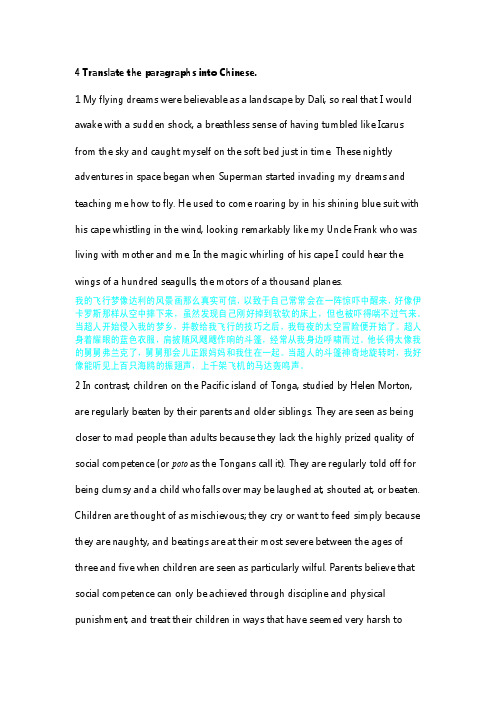
4 Translate the paragraphs into Chinese.1 My flying dreams were believable as a landscape by Dali, so real that I would awake with a sudden shock, a breathless sense of having tumbled like Icarus from the sky and caught myself on the soft bed just in time. These nightly adventures in space began when Superman started invading my dreams and teaching me how to fly. He used to come roaring by in his shining blue suit with his cape whistling in the wind, looking remarkably like my Uncle Frank who was living with mother and me. In the magic whirling of his cape I could hear the wings of a hundred seagulls, the motors of a thousand planes.我的飞行梦像达利的风景画那么真实可信,以致于自己常常会在一阵惊吓中醒来,好像伊卡罗斯那样从空中摔下来,虽然发现自己刚好掉到软软的床上,但也被吓得喘不过气来。
当超人开始侵入我的梦乡,并教给我飞行的技巧之后,我每夜的太空冒险便开始了。
超人身着耀眼的蓝色衣服,肩披随风飕飕作响的斗篷,经常从我身边呼啸而过。
他长得太像我的舅舅弗兰克了,舅舅那会儿正跟妈妈和我住在一起。
新标准大学英语3 unit2-Cultural Childhoods原文+译文

新标准大学英语3u n i t2-C u l t u r a l C h i l d h o o d s原文+译文-CAL-FENGHAI.-(YICAI)-Company One1Cultural Childhoods不同文化的童年1 When I look back on my own childhood in the 1970s and 1980s and compare it with children today, it reminds me of that famous sentence "The past is a foreign country: They do things differently there" (from L. P. Hartley's novel The Go-Between). Even in a relatively short period of time, I can see the enormous transformations that have taken place in children's lives and in the ways they arethought about and treated.每当我回顾20世纪七八十年代我的童年时光,并将它与现在孩子的童年相比较时,就会想起句名言:“往昔是异国他乡,那里有着不同的习俗”(可参见L.P.哈特利的小说《传信人》)。
甚至在相对短暂的一段时间内,我也能够察觉到儿童的生活以及人们对待儿童的方式上所经历的巨大变化。
2.Looking further back I can see vast differences between contemporary and historical childhoods. Today, children have few responsibilities, their lives are characterized by play not work, school not paid labour, family rather than public life and consumption instead of production. Yet this is all relatively recent. A hundred years ago, a 12 year old working in a factory would have been perfectly acceptable. Now, it would cause social services' intervention and the prosecution of both parents and factory owner.回顾更久远的岁月,我可以看到现在和古代童年生活的巨大差别。
新标准大学英语综合教程3课文
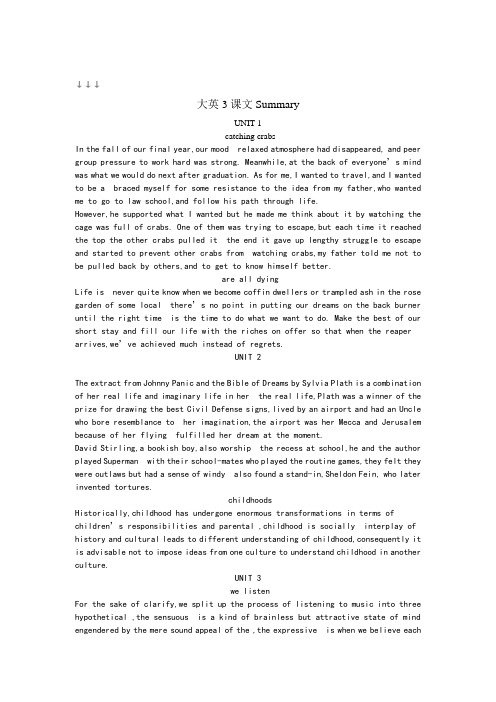
↓↓↓大英3课文SummaryUNIT 1catching crabsIn the fall of our final year,our mood relaxed atmosphere had disappeared, and peer group pressure to work hard was strong. Meanwhile,at the back of everyone’s mind was what we would do next after graduation. As for me,I wanted to travel,and I wanted to be a braced myself for some resistance to the idea from my father,who wanted me to go to law school,and follow his path through life.However,he supported what I wanted but he made me think about it by watching the cage was full of crabs. One of them was trying to escape,but each time it reached the top the other crabs pulled it the end it gave up lengthy struggle to escape and started to prevent other crabs from watching crabs,my father told me not to be pulled back by others,and to get to know himself better.are all dyingLife is never quite know when we become coffin dwellers or trampled ash in the rose garden of some local there’s no point in putting our dreams on the back burner until the right time is the time to do what we want to do. Make the best of our short stay and fill our life with the riches on offer so that when the reaper arrives,we’ve achieved much instead of regrets.UNIT 2The extract from Johnny Panic and the Bible of Dreams by Sylvia Plath is a combination of her real life and imaginary life in her the real life,Plath was a winner of the prize for drawing the best Civil Defense signs,lived by an airport and had an Uncle who bore resemblance to her imagination,the airport was her Mecca and Jerusalem because of her flying fulfilled her dream at the moment.David Stirling,a bookish boy,also worship the recess at school,he and the author played Superman with their school-mates who played the routine games,they felt they were outlaws but had a sense of windy also found a stand-in,Sheldon Fein, who later invented tortures.childhoodsHistorically,childhood has undergone enormous transformations in terms of children’s responsibilities and parental ,childhood is socially interplay of history and cultural leads to different understanding of childhood,consequently it is advisable not to impose ideas from one culture to understand childhood in another culture.UNIT 3we listenFor the sake of clarify,we split up the process of listening to music into three hypothetical ,the sensuous is a kind of brainless but attractive state of mind engendered by the mere sound appeal of the ,the expressive is when we believe eachpiece of music has a theme,which mirrors a different world of feeling,such as gaiety,,the musical is the ability to experience different musical elements,such as melodies,the rhythms,the harmonies,the tone colors usually listen to music on all three planes.mystery of Girl with a Pearl EarringThe painting Girl with a Pearl Earrin g is one of Dutch painter Johannes Vermeer’s shows a striking young woman wearing an exotic costume and a turban,peering over her shoulder straight out at the the name implies,it uses a pearl earring for a focal has been referred to as the Mona Lisa of the north,because,like Leonardo da Vinci’s painting,it appears to be a simple likeness of a woman with an enigmatic smile,yet which contains levels of meanings and much mystery in the painting contributes to its worldwide popularity and generates a thoroughly rewarding novel and a well-composed film.UNIT 4in corporate AmericaIn today’s American jobs are not what they used to long ago,when a father was asked about his job he could answer in terms that a child could come to grips ,when the parent take his offspring to his place of business in glass buildings that are really incomprehensive to ’s more,it’s safe bet that even grown men have trouble visualizing what other men does in their jobs with his ,it’s not difficult to imagine a poor child may answer”mulling over” after it beats me the mysteries of work,when his friends asks him of his father’s job.supposedly exciting times are really rather dullLiving in a world of unprecedented/dazzling change,there are never been anything quite like ,we are just ignorant of/about deeper historical patterns,take globalization for example,from historical context point of view,the world is almost simply do not live in a age of great technological innovation for all our enthusiasm about internet and staggering 90 percent of all web traffic is local,we are always be told the Internet has “opened up”the the Chinese curse runs “May you live in interesting times”,it can bring chaos and anxiety in the in the wake.UNIT 5at Joanne’sWhen a young black man arrives in a crowded and expensive restaurant,the head waiter makes him sit in the least comfortable place,even though a table has been booked for him and a “Ms Rogers”.When Ms Rogers arrives,the waiter realizes that she is a well-known Senator; and Ms Roger realizes that her friend has been treated badly because of the color of his waiter realizes his mistake too,and tries to make up for it,but it’s too late.theyThe writer uses stories about doing business between Swedes and Saudis to illustrate the differences between an individualist and a collectivist approach to business. They have different concepts of the role of personal relationships in business. The Swedes believe the business is done with a company while the Saudis think it shouldbe done with a person they know and the writer compares the characteristics of the collectivist and those of the individualist.In the most collectivist societies,the families are usually extended families while in the individualist societies,nuclear families are prevalent. People consider themselves as part of a “we”group or in-group in the collectivist contrast, the individualist think of themselves as “I”,their personal identity which is distinct from other people’s. A practical and psychological dependence relationship develops between the person and the in-group in the collectivist societies. However, rarely do people depend on a group in the individualist societies.UNIT 6Last man downThe text from Last Ma Down offers an eyewitness account of defining historical event of 9/11 attack from the perspective of Richard Picciotto, a firefighter; his story is that of a man, a hero,and a tragic event that inspired the nation. His recount isn’t one of death and destruction, but a celebration of life and it’s unpredictable nature.Eleanor RooseveltThe passage offers a hero who contrasts with brave firefighters. This time she is a woman of power and previlege who still wanted to devote herself to the sucess she believed in.Living in a male-dominated world, Eleanor Roosevelt showed growing concern for women’s issues, along with those for labor issues,youth and civil rights issues. Eleanor created new First Lady profile. She held a press conference for the female only. She was a great supporter for FDR, her wheel-bound husband, whose career as the US president offered her opportunity to come into her own.After FDR’s departure, she still held public posts to use her power to her beliefs. Anna Eleanor Roosevelt never ran on a par with men, she set the place.。
新标准大学英语综合教程3课文与课后翻译unit4
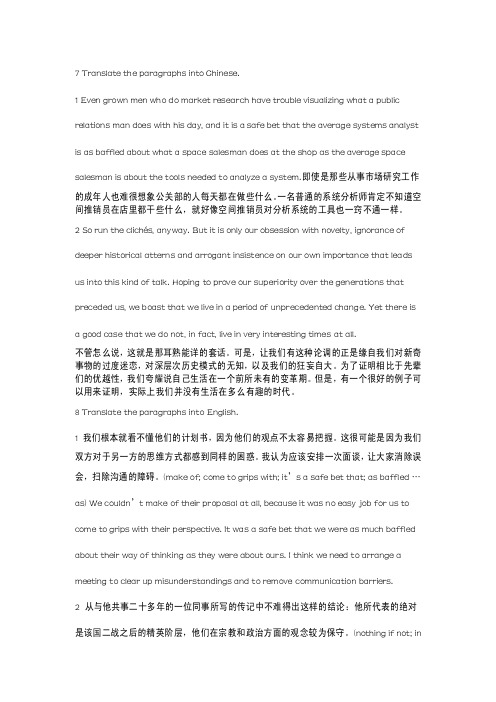
7 Translate the paragraphs into Chinese.1 Even grown men who do market research have trouble visualizing what a public relations man does with his day, and it is a safe bet that the average systems analyst is as baffled about what a space salesman does at the shop as the average space salesman is about the tools needed to analyze a system.即使是那些从事市场研究工作的成年人也难很想象公关部的人每天都在做些什么。
一名普通的系统分析师肯定不知道空间推销员在店里都干些什么,就好像空间推销员对分析系统的工具也一窍不通一样。
2 So run the clichés, anyway. But it is only our obsession with novelty, ignorance of deeper historical atterns and arrogant insistence on our own importance that leads us into this kind of talk. Hoping to prove our superiority over the generations that preceded us, we boast that we live in a period of unprecedented change. Yet there is a good case that we do not, in fact, live in very interesting times at all.不管怎么说,这就是那耳熟能详的套话。
新标准三起第三册课文

Module 1 Unit 1……seventeen,eighteen,nineteen,twenty! ……ten ,eleven ,twelve,look ,Weiwei.Here’s a red one……Thirteen…………and a green one .Fourteen……This is a blue one……Fifteen…………and this is a yellow one . Sixteen……Here’s a purple one……Seventeen…………and a pink one . Eighteen……A white one ……Ninteen …………and an orange one ! Twenty !Hooray !Oh,no ! Look . Hahaha !Unit 2 I’ve got twenty-six points .Have you got an elephant ? Yes ,I have .Have you got a tiger ?No , I haven’t .Have you got a lion? Y es ,I have .I’ve got twenty-two points .I’ve got twenty-six points . I’m the winner .Module 2 Unit 1 Go straight on .Look , Sam .This dog is lost .My name is Doudou .I live in No.2 , West Lake Road . Excuse me .Where’s No.2,West Lake Road ,please ?Turn left .Go straight on .Turn right .It’s next to a supermarket .Thank you .Byebye .Goodbye .Thank you so much . Y ou’re welcome .Unit 2 It’s at the station .Where is Train 1 ?It’s up the hill .Where is Train 2 ? It’s dow n the hill .Where is Train 3 ? It’s near the houses.Where is Train 4? It’s at the station.Module 3 Unit 1 She’s writing a letter.[1]Look at these pictures .[2]This is my friend ,Lingling .She’s writing a letter.[3]This is my friend ,Da ming .He’s taking pictures .[4]This is my sister ,Amy .She’s talking to her friend .[5]This is my little brother,Tom .He’s playing with a toy train .Unit 2What are you doing ?[1]What are you doing ,children?[2]I’m listening to music![3]I’m watchi ng TV ![4]What’s Tom doing ? Oh,he’s reading a book !Ha,ha,ha……Module 4 Unit 1 What are they doing ?[1]Let’s get on the bus .We can see lots of interesting things . Okay .[2]Look at the people in the park .[3]What are they doing ?They’re doing taijiquan.[4]Look at the people on the lake .[5]What are they doing ? They’re rowing a dragon boat .[6]Look at the men under the tree .What are they doing ?They’re playing chess .[7]Look at these girls .What are they drinking ?[8]They’re drin king soybean milk ![9]I’m hungry . I’m hungry ,too .Let’s go !Module 5 Unit 1 Do you want some rice ?[1]Look ,Amy .Chinese fast food ![2]Do you want some rice ? No, thank you .[3]Look at this man .What is he doing ? He’s making noodles .[4]Do you want some noodles ? Y es ,please .[5]Mum .It’s nice . Y es !But chopsticks are difficult .[6]Have you got chopsticks in England ? No, we haven’t .[7]Have you got fast food in England ?[8]Yes ,we have .Unit 2 I’m making dumplings .[1]What are you doing ,Daming ?I’m making dumplings.[2]Do you want some ? Y es,please![3]What are you doing,Mum?I’m cooking vegetables .[4]Do you want some ? Y es ,please .I love vegetables . No,thank you .Module 6 Unit 1 Can you run fast ?[1]Amy ,can you run fast ? Y es ,I can.[2]Ahhh, I’m the winner .Y ou can’t run fast ![3]Daming ,can you jump high ? Y es, I can .[4]Look!I’m the winner . Y ou can’t jump high .Y es ,Sam can jump very high ![5]Can you jump far ,Sam? Y es ,I can . Can you ?[6]No,I can’t .Y ou’re the winner .[7]Can you ride fast ? Y es ,I can .[8]Whoops!No,I can’t !Unit 2 Y es ,I can .[1]Can you make a cake ,Sam? Y es ,I can ./ No, I can’t .[2]Can you play the flute,Amy? Y es ,I can ./ No, I can’t .[3]Can you wash clothes,Lingling? Y es ,I can ./ No, I can’t .[4]Can you draw a dragon,Daming? Y es ,I can ./ No, I can’t .Module 7 Unit 1 We’re going to go to Hainan.[1]It’s bedtime,children . We’re going to go to Hainan tomorrow .[2]We’re going to go by plane! And we’re going to get up at 5 o’clock![3]Hello.What’s your name ? I’m Sam .I’m from England .[4]I’m Xiaoyong. I’m from China .[5]We’re going to go to Hainan. I’m going to swim in the sea.I’m going to visit my grandpa .And I’m going to swim ,too.[6]I’m going to swim now![7]Oh no!This is Xiaoyong’s bag! And Xiaoyong’s swimsuit !Unit 2 We’re going to visit the Ming Tombs .[1]We’re going to visit the Ming Tombs tomorrow . Hooray!( The next day )[2]Look!Stone animals. Lions,camels and elephants .[3]Roar! And scary animals ,too.What’s that ?It’s a monster .Help![4]Roar! Ha,ha,ha!Module 8 Unit 1 What are you going to do ?[1]We’re going to have a Sports Day.[2]What are you going to do for Sports Day?I’m going to run the 100 metres .[3]I’m going to run every day .[4]Where are you going ,Daming? I’m going to run in the park . (Sports Day)[5] Goodbye ,Daming!Good luck! Thank you ! Bye-bye .[6]Come on ,Daming.Run!Run!Y es! I’m the winner !I’m the winner !Unit 2 I’m going to do the high jump.What are you going to do for Sports Day?I’m going to do the high jump.I’m going to do the long jump.I’m going to run the 200 metres .I’m going to run the 100 metres .Module 9 Unit 1 Can I have some sweets ?[1]Mum, I’m hungry .Can I have some soup? Sorry,you can’t .[2]But I’m hungry .Can I have some sweets ,please? Sorry ,you can’t .[3]Can I have some bread ? Sorry ,you can’t .But Mum ,I'm VERY HUNGRY![4]e her e ,Amy. Mum ,I can’t see . It’s very dark .Well ,turn on the light .[5]Happy birthday,Amy! Thank you .[6]Now you can have some biscuits ,some fruit and some cake .Happy birthday to you …… Thank you ,Mum.Unit 2 Happy Halloween![1]Today is Halloween![2]Hello! Can I come in ? Oh!Hello! Y es ,of course.[3]Can I have some sweets ? Here you are .[4]Thank you !Whoops ! Happy Halloween ,Tom!Module 10 Unit 1 There is one birthday in May.[1]What are you doing ,Li ngling ? I’m counting my friends’ birthdays .[2]January.There are three .February .There are six .March .There is one .April . There are two .May . There is one .June . there are four …..[3]How many birthdays are there ? There are thirty-five .[4]I’m going to go to thirty-five birthday parties this year!So you’re very happy! Y es ,I am !Unit 2 There are twelve months in the year.There are five birthdays in July.August one; September two; October three; November six; December one。
新标准大学英语综合教程3课文翻译_珍藏版
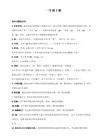
我们所谓的激动人心的时代其实很乏味
为激动人心的时代也许真的很乏味。
就拿“坏事成三”这种想法来说吧(就像等公交车一样,要么不来,要么一下来三辆!)。 这种流传甚广的观念可能根本经不起科学的检验,但是它必定有一些现实的依据,不然的话也不会有这么个说法了。 那么,什么样的解释才是合理的呢?
理东西。 父亲可能会带着孩子去他干活的地方,让他看着自己修马车,或是打桌子。 要是孩子问“爸爸,您是干什么的?”,爸爸会用孩子能理解的语言回答他,比如:“我是修蒸汽机的”,或者“我是做马项圈的”。
礼上才送偶数数量的花。
著居民一样,根据阴历来过节,而这又完全是另外一回事儿了。
去欧洲寻求更好的生活。 他们向从事此项非法生意的黑帮支付高达两千欧元的费用,可是旅途极不舒服,卫生条件极其恶劣,而且还要遭受烈日的暴晒。这还算好的了,有时候,那些严重超载的船只到不了对岸,几天之后海水会把他们的尸体冲到欧洲南部的海滩上。 那些到达蓝佩杜萨岛的人则被迅速集中起来,押送到拘留中心,由那里的官员决定是否允许他们“避难”,允许避难就是给移民居住权。 许多人会被遣送回家,有些人则偷偷地登陆,躲开了移民官——但他们往往没有意识到他们是在一个小岛上,当他们去向当地人打听火车站的位置时,当地人会感到很吃惊。
回纽约的时候会给孩子们带几条小鳄鱼。 后来短吻鳄越长越大,不像小时候那么可爱了。大人们只好把它们扔进抽水马桶里冲掉。 但是其中一些短吻鳄活了下来,所以现在有一些成年短吻鳄在纽约曼哈顿街区下面游荡。
年年初,我们三个人聚在一起,设计了研究方案。 方案决定让我接受八个有关音乐技巧训练的测试,涵盖各种音乐活动,比如高音音准练习、音阶和节奏练习。 我还要学唱两首歌,一首是约翰 ? 拉特的《盖尔人的祝祷文》,另一首是亨德尔的《请让我哭泣吧》。 听帕姆唱这两首歌,让我想起了写这本书的动力:为什么进化会创造出这样的一个物种,拥有如此美妙的歌喉?
新标准大学英语综合教程3课文

↓↓↓大英3课文SummaryUNIT 1catching crabsIn the fall of our final year,our mood relaxed atmosphere had disappeared, and peer group pressure to work hard was strong. Meanwhile,at the back of everyone’s mind was what we would do next after graduation. As for me,I wanted to travel,and I wanted to be a braced myself for some resistance to the idea from my father,who wanted me to go to law school,and follow his path through life.However,he supported what I wanted but he made me think about it by watching the cage was full of crabs. One of them was trying to escape,but each time it reached the top the other crabs pulled it the end it gave up lengthy struggle to escape and started to prevent other crabs from watching crabs,my father told me not to be pulled back by others,and to get to know himself better.are all dyingLife is never quite know when we become coffin dwellers or trampled ash in the rose garden of some local there’s no point in putting our dreams on the back burner until the right time is the time to do what we want to do. Make the best of our short stay and fill our life with the riches on offer so that when the reaper arrives,we’ve achieved much instead of regrets.UNIT 2The extract from Johnny Panic and the Bible of Dreams by Sylvia Plath is a combination of her real life and imaginary life in her the real life,Plath was a winner of the prize for drawing the best Civil Defense signs,lived by an airport and had an Uncle who bore resemblance to her imagination,the airport was her Mecca and Jerusalem because of her flying fulfilled her dream at the moment.David Stirling,a bookish boy,also worship the recess at school,he and the author played Superman with their school-mates who played the routine games,they felt they were outlaws but had a sense of windy also found a stand-in,Sheldon Fein, who later invented tortures.childhoodsHistorically,childhood has undergone enormous transformations in terms of children’s responsibilities and parental ,childhood is socially interplay of history and cultural leads to different understanding of childhood,consequently it is advisable not to impose ideas from one culture to understand childhood in another culture.UNIT 3we listenFor the sake of clarify,we split up the process of listening to music into three hypothetical ,the sensuous is a kind of brainless but attractive state of mind engendered by the mere sound appeal of the ,the expressive is when we believe eachpiece of music has a theme,which mirrors a different world of feeling,such as gaiety,,the musical is the ability to experience different musical elements,such as melodies,the rhythms,the harmonies,the tone colors usually listen to music on all three planes.mystery of Girl with a Pearl EarringThe painting Girl with a Pearl Earrin g is one of Dutch painter Johannes Vermeer’s shows a striking young woman wearing an exotic costume and a turban,peering over her shoulder straight out at the the name implies,it uses a pearl earring for a focal has been referred to as the Mona Lisa of the north,because,like Leonardo da Vinci’s painting,it appears to be a simple likeness of a woman with an enigmatic smile,yet which contains levels of meanings and much mystery in the painting contributes to its worldwide popularity and generates a thoroughly rewarding novel and a well-composed film.UNIT 4in corporate AmericaIn today’s American jobs are not what they used to long ago,when a father was asked about his job he could answer in terms that a child could come to grips ,when the parent take his offspring to his place of business in glass buildings that are really incomprehensive to ’s more,it’s safe bet that even grown men have trouble visualizing what other men does in their jobs with his ,it’s not difficult to imagine a poor child may answer”mulling over” after it beats me the mysteries of work,when his friends asks him of his father’s job.supposedly exciting times are really rather dullLiving in a world of unprecedented/dazzling change,there are never been anything quite like ,we are just ignorant of/about deeper historical patterns,take globalization for example,from historical context point of view,the world is almost simply do not live in a age of great technological innovation for all our enthusiasm about internet and staggering 90 percent of all web traffic is local,we are always be told the Internet has “opened up”the the Chinese curse runs “May you live in interesting times”,it can bring chaos and anxiety in the in the wake.UNIT 5at Joanne’sWhen a young black man arrives in a crowded and expensive restaurant,the head waiter makes him sit in the least comfortable place,even though a table has been booked for him and a “Ms Rogers”.When Ms Rogers arrives,the waiter realizes that she is a well-known Senator; and Ms Roger realizes that her friend has been treated badly because of the color of his waiter realizes his mistake too,and tries to make up for it,but it’s too late.theyThe writer uses stories about doing business between Swedes and Saudis to illustrate the differences between an individualist and a collectivist approach to business. They have different concepts of the role of personal relationships in business. The Swedes believe the business is done with a company while the Saudis think it shouldbe done with a person they know and the writer compares the characteristics of the collectivist and those of the individualist.In the most collectivist societies,the families are usually extended families while in the individualist societies,nuclear families are prevalent. People consider themselves as part of a “we”group or in-group in the collectivist contrast, the individualist think of themselves as “I”,their personal identity which is distinct from other people’s. A practical and psychological dependence relationship develops between the person and the in-group in the collectivist societies. However, rarely do people depend on a group in the individualist societies.UNIT 6Last man downThe text from Last Ma Down offers an eyewitness account of defining historical event of 9/11 attack from the perspective of Richard Picciotto, a firefighter; his story is that of a man, a hero,and a tragic event that inspired the nation. His recount isn’t one of death and destruction, but a celebration of life and it’s unpredictable nature.Eleanor RooseveltThe passage offers a hero who contrasts with brave firefighters. This time she is a woman of power and previlege who still wanted to devote herself to the sucess she believed in.Living in a male-dominated world, Eleanor Roosevelt showed growing concern for women’s issues, along with those for labor issues,youth and civil rights issues. Eleanor created new First Lady profile. She held a press conference for the female only. She was a great supporter for FDR, her wheel-bound husband, whose career as the US president offered her opportunity to come into her own.After FDR’s departure, she still held public posts to use her power to her beliefs. Anna Eleanor Roosevelt never ran on a par with men, she set the place.。
新标准大学英语综合教程3课文原文

新标准大学英语综合教程3课文原文We all listen to music according to our separate capacities.But, for the sake of analysis, the whole listening process may become clearer if we break it up into its component parts, so to speak.In certain sense we all listen to music on three separate planes.For lack of a better terminology, one might name these: 1) the sensuous plane, 2) the expressive plane, 3) the sheerly musical plane.The only advantage to be gained from mechanically splitting up the listening process into these hypothetical planes is the clearer view to be had of the way in which we listen.The simplest way of listening to music is to listen for the sheer pleasure of the musical sound itself.That is the sensuous plane.It is the plane on which we hear music without thinking, without considering it in any way.One turns on the radio while doing something else andabsent-mindedly bathes in the sound.A kind of brainless but attractive state of mind is engendered by the mere sound appeal of the music.The surprising thing is that many people who consider themselves qualified music lovers abuse that plane in listening.They go to concerts in order to lose themselves.They use music as a consolation or an escape.They enter an ideal world where one doesn’t have to think of the realities of everyday life.Of course they aren’t thinking about the music either.Music allows them to leave it, and they go off to a place to dream, dreaming because of and apropos of the music yet never quite listening to it.Yes, the sound appeal of music is a potent and primitive force, but you must not allow it to usurp a disproportionate share of your interest.The sensuous plane is an important one in music, a very important one, but it does not constitute the whole story.The second plane on which music exists is what I have called the expressive one.Here, immediately, we tread on controversial posers have a way of shying away from any discussion of m usic’s expressive side.Did not Stravinsky himself proclaim that his music was an “object”, a “thing”, with a life of its own, and with no other meaning than its own purely musical existence?This intransigent attitude of Stravinsky’s may be due to the fact that so many people have tried to read different meanings into so many pieces.Heaven knows it is difficult enough to say precisely what it is that a piece of music means, to say it definitely to say it finally so that everyone is satisfied with your explanation.But that should not lead one to the other extreme of denying to music the right to be “expressive”.Listen, if you can,to the 48 fugue themes of Bach’s Well-tempered Clavichore.Listen to each theme, one after another.You will soon realize that each theme mirrors a different world of feeling.You will also soon realize that the more beautiful a theme seems to you the harder it is to find any word that will describe it to your complete satisfaction.Yes, you will certainly know whether it is a gay theme or a sad one.You will be able, on other words, in your own mind, to draw a frame of emotional feeling around your theme.Now study the sad one a little closer.Try to pin down the exact quality of its sadness.Is it pessimistically sad or resignedly sad; is it fatefully sad or smilingly sad?Let us suppose that you are fortunate and can describe to your own satisfaction in so many words the exact meaning of your chosen theme.There is still no guarantee that anyone else will be satisfied.Nor need theybe.The important thing is that each one feels for himself the specific expressive quality of a theme or, similarly, an entire piece of music.And if it is a great work of art, don’t expect it to mean exactly the same thing to you each time you return to it.The third plane on which music exists is the sheerly musical plane.Besides the pleasurable sound of music and the expressive feeling that it gives off, music does exist in terms of the notes themselves and of their manipulation.Most listeners are not sufficiently conscious of this third plane.It is very important for all of us to become more alive to music on its sheerly musical plane.After all, an actual musical material is being used.The intelligent listener must be prepared to increase his awareness of the musical material and what happens to it.He must hear the melodies, the rhythms, the harmonies, the tone colors in a more conscious fashion.But above all he must, in order to follow the line of the composer’s thought, know something of the principles of musical form.Listening to all of these elements is listening to the sheerly musical plane.Let me repeat that I have split up mechanically the three separate planes on which we listen merely for the sake of greater clarity. Actually, we never listen on one or the other of these planes.What we do is to correlate them—listening in all three ways at the same time.It takes no mental effort, for we do it instinctively Perhaps an analogy with what happens to us when we visit the theater will make this instinctive correlation clearer.In the theater, you are aware of the actors and actresses, costumes and sets, sounds and movements.All these give one the sense that the theater is a pleasant place to be in.They constitute the sensuous plane in our theatrical reactions.The expressive plane in the theater would be derived from the feeling that you get from what is happening on the stage.You are moved to pity, excitement, or gaiety.It is this general feeling, generated aside from the particular words being spoken, a certain emotional something which exists on the stage,that isanalogous to the expressive quality in music.The plot and plot development is equivalent to our sheerly musical plane.The playwright creates and develops a character in just the same way that a composer creates and develops a theme.According to the degree of your awareness of the way in which the artist in either field handles his material will you become a more intelligent listener.It is easy enough to see that the theatergoer never is conscious of any of these elements separately.He is aware of them all at the same time.The same is true of music listening.We simultaneously and without thinking listen on all three planes.It is not surprising that modern children tend to look blank and dispirited when i nformed that they will someday have to “go to work andmake a living”. The problem is that they cannot visualize what work is in corporate Am erica.Not so long ago, when a parent said he was off to work, the child knew very well what was about to happen. His parent was going to make something or fix something. T he parent could take his offspring to his place of business and let him watch while he re paired a buggy or built a table.When a child asked, “What kind of work do you do, Daddy?” his father could an swer in terms that a child could come to grips with, such as “I fix steam engines” or “I make horse collars.Well, a few fathers still fix steam engines and build tables, but most do not. Nowa days, most fathers sit in glass buildings doing things that are absolutely incomprehensib le to children. The answers they give when asked, “What kind of work do you do, Dadd y?” are likely to be utterlymystifying to a child.”I sell space””I do market research.”,”I am a data processor.””I am in public rel ations.””I am a systems analyst” Suchexplanations must seem nonsense to a child. How can he possibly envision anyone analy zing a system or researching a market?Even grown men who do market research have trouble visualizing what a public relations man does with his day, and it is a safe bet that the average systems analyst is as baffled about what a space salesman does at the shop as the average space salesman is about the tools needed to analyze a system.In the common everyday job, nothing is made any more. Things are now made b y machines. Very little is repaired. The machines that makethings make them in such a fashion that they will quickly fall apart in such a way that r epairs will be prohibitively expensive. Thus the buyer isencouraged to throw the thing away and buy a new one. In effect, the machines are mak ing junk.The handful of people remotely associated withthese machines can, of course, tell their inquisitive children “Daddy makes junk”. Most of the workforce, however, is too remote from junkproduction to sense any contribution to the industry. What do these people do?Consider the typical 12-story glass building in the typical American city. Nothing is being made in this building and nothing is being repaired, including the building its elf. Constructed as a piece of junk, the building will be discarded when it wears out, a nd another piece of junk will be set in its place.Still, the building is filled with people who think of themselves as working. At a ny given moment during the day perhaps one-third of them will be talking into teleph ones. Most of these conversations will be about paper, for paper is what occupies nearl y everyone in this building. Somejobs in the building require men to fill paper with words. There are persons who type neatly on paper and persons who read paper and jot notes in the margins. Some perso ns make copies of paper and other persons deliver paper. There are persons who file p aper and persons who unfile paper.Some persons mail paper. Some persons telephone other persons and ask that p aper be sent to them. Others telephone to ascertain thewhereabouts of paper. Some persons confer about paper. In the grandest offices, men approve of some paper and disapprove of other paper.The elevators are filled throughout the day with young men carrying paper fro m floor to floor and with vital men carrying paper to bediscussed with other vital men.What is a child to make of all this? His father may be so eminent that he lunche s with other men about paper. Suppose he brings his son towork to give the boy some idea of what work is all about. What does the boy see hap pening?His father calls for paper. He reads paper. Perhaps he scowls at paper. Perhaps he makes an angry red mark on paper. He telephones another man and says they had better lunch over paper.At lunch they talk about paper. Back at the office, the father orders the paper r etyped and reproduced in quintuplicate, and then sent toanother man for comparison with paper that was reproduced in triplicate last year.Imagine his poor son afterwards mulling over the mysteries of work with a frie nd, who asks him, ”What’s your father do?” What can the boy reply? “It beats me,” p erhaps, if he is not very observant. Or if he is, “Somethi ng that has to do with making junk, I think. Same as everybodyelse.”It was snowing heavily, and although every true New Yorker looks forward to a white Christmas, the shoppers on Fifth Avenue were in a hurry, not just to track down the last-minute presents, but to escape the bitter cold and get home with their families for Christmas Eve.Josh Lester turned into 46th Street. He was not yet enjoying the Christmas spirit, because he was still at work, albeit a working dinner at Joanne's. Josh was black, in his early thirties, and an agreeable-looking person, dressed smartly but not expensively. He was from a hard-working family in upstate Virginia, and was probably happiest back home in his parents' house. But his demeanor concealed a Harvard law degree and an internship in DC with a congressman, a junior partnership in a New York law firm, along with a razor-sharp intellect and an ability to think on his feet. Josh was very smart.The appointment meant Josh wouldn't get home until after Christmas. He was not, however, unhappy. He was meeting Jo Rogers, the senior senator for Connecticut, and one of the best-known faces in the US. Senator Rogers was a Democrat in her third term of office, who knew Capitol Hill inside out but who had nevertheless managed to keep her credibility with her voters as a Washington outsider. She was pro-abortion, anti-corruption, pro-low carbon emissions and anti-capital punishment, as fine a progressive liberal as you could find this side of the Atlantic. Talk show hosts called her Honest Senator Jo, and a couple of years ago, Time magazine had her in the running for Woman of the Year. It was election time in the following year, and the word was she was going to run for the Democratic nomination. Rogers had met Josh in DC, thought him highly competent, and had invited him to dinner.Josh shivered as he checked the address on the slip of paper in his hand. He'd never been to Joanne's, but knew it by reputation, not because of its food, which had often been maligned, or its jazz orchestra, which had a guest slot for awell-known movie director who played trumpet, but because of the stellar quality of its sophisticated guests: politicians, diplomats, movie actors, hall-of-fame athletes, journalists, writers, rock stars and Nobel Prize winners – in short, anyone who was anyone in this city of power brokers.Josh told him, and although the waiter refrained from curling his lip, he managed to show both disdain and effortless superiority with a simple flaring of his nostrils.“Yes, Senator, please come this way,” and as Senator Rogers passed through the crowded room, heads turned as the diners recognized her and greeted her with silent applause. In a classless society, Rogers was the closest thing to aristocracy that America had. Alberto hovered for a moment, then went to speak to a colleague.After two hours, Rogers and Josh got up to leave. There was a further flurry of attention by the staff, including an offer by Alberto to waive payment of the bill, which Rogers refused. As they were putting on their coats, Rogers said, “Thank you, Alberto. Oh, have I introduced you to my companion, Josh Lester?”A look of panic, followed by one of desperate optimism flashed across Alberto's face.“Ah, not yet, no, ... not properly, ” he said weakly.“Josh Lester. This is the latest recruit to my election campaign. He's going to be my new deputy campaign manager, in charge of raising donations. And if we get that Republican out of the White House next year, you've just met my Chief of Staff.”It came as if from nowhere.There were about two dozen of us by the bank of elevators on the 35th floor of the north tower of the World Trade Center. We were firefighters, mostly, and we were in various stages of exhaustion. Some guys were sweating like pigs. Some had their turnout coats off, or tied around their waists. Quite a few were breathing heavily. Others were raring to go. All of us were taking a beat to catch our breaths, and our bearings, figure out what the hell was going on. We'd been at this thing, hard, for almost an hour, some a little bit less, and we were nowhere close to done. Of course, we had no idea what there was left to do, but we hadn't made a dent.And then the noise started, and the building began to tremble, and we all froze. Dead solid still. Whatever there had been left to do would now have to wait. For what, we had no idea, but it would wait. Or, it wouldn't, but that wasn't the point. The point was that no one was moving. To a man, no one moved, except to lift his eyes to the ceiling, to see where the racket was coming from. As if we could see clear through the ceiling tiles for an easy answer. No one spoke. There wasn't time to turn thought into words, even though there was time to think. For me anyway, there was time to think, too much time to think, and my thoughts were all over the place. Every possibleworst-case scenario, and a few more besides. The building was shaking like in an earthquake, like an amusement park thrill ride gone berserk, but it was the rumble that struck me still with fear. The sheer volume of it. The way it coursed right through me. I couldn't think what the hell would make a noise like that. Like a thousand runaway trains speeding towards me. Like a herd of wild beasts. Like the thunder of a rockslide. Hard to put it into words, but whatever the hell it was it was gaining speed, and gathering force, and getting closer, and I was stuck in the middle, unable to get out of its path.It's amazing, the kind of thing you think about when there should be no time to think. I thought about my wife and my kids, but only fleetingly and not in any kind of life-flashing-before-my-eyes sort of way. I thought about the job, how close I was to making deputy. I thought about the bagels I had left on the kitchen counter back at the firehouse. I thought how we firemen were always saying to each other, "I'll see you at the big one." Or, "We'll all meet at the big one." I never knew how it started, or when I'd picked up on it myself, but it was part of our shorthand.Meaning, no matter how big this fire is, there'll be another one bigger, somewhere down the road. We'll make it through this one, and we'll make it through that one, too. I always said it, at big fires, and I always heard it back, and here I was, thinking I would never say or hear these words again, because there would never be another fire as big as this. This was the big one we had all talked about, all our lives, and if I hadn't known this before –just before these chilling moments – this sick, black noise now confirmed it.I fumbled for some fix on the situation, thinking maybe if I understood what was happening I could steel myself against it. All of these thoughts were landing in my brain in a kind of flashpoint, one on top of the other and all at once, but there they were. And each thought landed fully formed, as if there might be time to act on each, when in truth there was no time at all.Richard Picciotto (also known as Pitch) was in the north tower of the World Trade Center when it collapsed in theaftermath of the massive terrorist attack on 11 September 2001. A battalion commander for the New York Fire Department, he was on the scene of the disaster within minutes of the attack, to lead seven companies of firefighters into the tower to help people trapped and to extinguish fires blazing everywhere.The north tower was the first of the twin towers to be hit. It was followed 17 minutes later by the south tower. The south tower, however, was the first to collapse, at 9:59 am. At that moment, Picciotto was in the north tower, racing upwards by the stairs because the elevators were out of action. He then gave the order to evacuate. On the 12th story he came across 50 people amid the debris, too badly hurt or frightened to move. Picciotto and his men helped them down. When he reached the seventh floor, the tower fell, and he was buried beneath thousands of tons of rubble. He eventually came round four hours later, leading his men to safety.Picciotto was the highest ranking firefighter to survive the attack. The chief of the department, the first deputy and the chief of rescue operations had all been killed. Altogether the death toll included 343 firefighters and more than 3,000 civilians.Toast always lands butter side down. It always rains on bank holidays. You never win the lottery, but other people you know seem to ... Do you ever get the impression that you were born unlucky? Even the most rational person can be convinced at times that there is a force out there making mishaps occur at the worst possible time. We all like to believe that Murphy's Law is true。
新标准大学英语综合教程3课文翻译(1-10单元30篇).
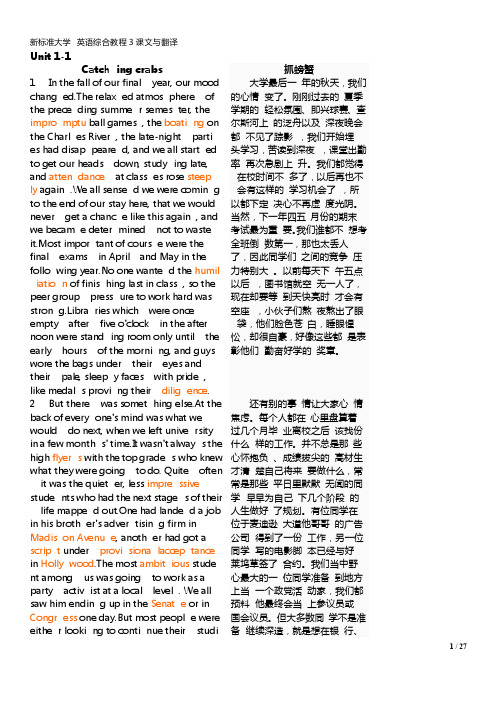
Unit 1-1Catching crabs1 In the fall of our finalyear, our mood changed.The relaxed atmosphereof the preceding summer semester, the impromptu ball games, the boating on the Charles River, the late-nightparties had disappeared, and we all started to get our headsdown, studying late, and attendanceat classes rose steeply again.We all sensed we were coming to the end of our stay here, that we wouldnever get a chance like this again, and we became determinednot to wasteit.Most important of course were the finalexamsin Apriland May in the following year.No one wanted the humil iation of finishing last in class, so the peer grouppressure to work hard was strong.Libraries whichwere once emptyafterfive o'clockin the afternoon were standing room only untilthe earlyhoursof the morning, and guys wore the bags undertheir eyes and theirpale, sleepy faceswith pride, like medals proving theirdiligence.2 But therewas something else.At the back of everyone's mind was what we woulddo next, when we left universityin a few months' time.It wasn't always the high flyers with the top grades who knew what they were goingto do. Quiteoften it was the quieter, less impressivestudents who had the next stages of their life mapped out.One had landed a job in his brother's advertising firm in Madison Avenue, another had got a script underprovisionalacceptancein Hollywood.The most ambitious student amongus was goingto work as a partyactivist at a locallevel. We all saw him ending up in the Senate or in Congress one day.But most people were either looking to continue theirstudi抓螃蟹大学最后一年的秋天,我们的心情变了。
